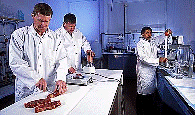United States Department of Agriculture: Agricultural Research Service, Lincoln, Nebraska

Roman L. Hruska U.S. Meat Animal Research Center: Reports
ORCID IDs
AK Childers https://orcid.org/0000-0002-0747-8539
Geib https://orcid.org/0000-0002-9511-5139
Sim https://orcid.org/0000-0003-0914-6914
Poelchau https://orcid.org/0000-0002-4584-6056
Scully https://orcid.org/0000-0002-8315-5619
Smith https://orcid.org/0000-0003-1611-6828
CP Childers https://orcid.org/0000-0002-1253-5550
Date of this Version
7-1-2021
Document Type
Article
Citation
Insects (2021) 12: 626
doi: 10.3390/ insects12070626
Abstract
The phylum Arthropoda includes species crucial for ecosystem stability, soil health, crop production, and others that present obstacles to crop and animal agriculture. The United States Department of Agriculture’s Agricultural Research Service initiated the Ag100Pest Initiative to generate reference genome assemblies of arthropods that are (or may become) pests to agricultural production and global food security. We describe the project goals, process, status, and future. The first three years of the project were focused on species selection, specimen collection, and the construction of lab and bioinformatics pipelines for the efficient production of assemblies at scale. Contig-level assemblies of 47 species are presented, all of which were generated from single specimens. Lessons learned and optimizations leading to the current pipeline are discussed. The project name implies a target of 100 species, but the efficiencies gained during the project have supported an expansion of the original goal and a total of 158 species are currently in the pipeline. We anticipate that the processes described in the paper will help other arthropod research groups or other consortia considering genome assembly at scale.


Comments
United States government work
Also licensed Creative Commons Attribution (CC BY)